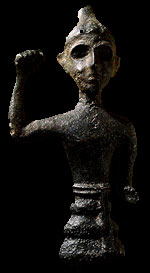The Jebusites - Encyclopedia
JEBUS; JEBUSI; JEBUSITE
je'-bus, jeb'-u-si, jeb'-u-zit (yebhuc, ha-yebhuci): "Jebus" is an old name for Jerusalem (Jud 19:10,11; 1Ch 4:5 parallel 2Sa 5:6-9, "the same is Jerus"; see preceding article). "Jebusi" (literally, "Jebusite") is also used as a name for the city in the King James Version (Jos 18:16,28; compare Jos 15:8); the Revised Version (British and American) correctly renders "Jebusite" (see JERUSALEM). "Jebusites," for the people (in the King James Version Ge 15:21; Ex 3:8,17, etc.), does not occur in Hebrew in the plural; hence, in the Revised Version (British and American) is always rendered in the singular, "Jebusite." The "Jebusite" is said in Ge 10:16; 1Ch 1:14 to be the 3rd son of Canaan, i.e. of the country of Canaan. Elsewhere he represents a tribe separate from the Canaanites. He stands between Heth and the Amorite (compare Nu 13:29; Jos 11:3; Eze 16:3,15). In the lists of the peoples inhabiting Palestine the "Jebusite" is always placed last, a fact indicative, probably, of their smaller number.
To what race the Jebusites belonged is doubtful. Their name does not seem Semitic, and they do not make their appearance till after the patriarchal period.
The original name of Jerusalem was Babylonian, Uru-Salim, "the city of Salim," shortened into Salem in Ge 14:18 and in the inscriptions of the Egyptian kings Ramses II and Ramses III. In the Tell el-Amarna Letters (1400 BC) Jerusalem is still known as Uru-Salim, and its king bears a Hittite name, implying that it was at the time in the possession of the Hittites. His enemies, however, were closing around him, and one of the tablets shows that the city was eventually captured and its king slain. These enemies would seem to have been the Jebusites, since it is after this period that the name "Jebus" makes its appearance for the first time in the Old Testament (Jud 19:10,11).
The Jebusite king at the time of the conquest was Adoni-zedek, who met his death at Beth-boron (Jos 10:1 ; in Jos 10:5 the word "Amorite" is used in its Babylonian sense to denote the inhabitants of Canaan generally). The Jebusites were a mountain tribe (Nu 13:29; Jos 11:3). Their capital "Jebus" was taken by the men of Judah and burned with fire (Jud 18), but they regained possession of, and held, the fortress till the time of David (2Sa 5:6 ).
When Jerusalem was taken by David, the lives and property of its Jebusite inhabitants were spared, and they continued to inhabit the temple-hill, David and his followers settling in the new City of David on Mt. Zion (Jos 15:8,63; Jud 1:21; 19:11). And as Araunah is called "king" (2Sa 24:23), we may conclude that their last ruler also had been lowed to live. His name is non-Sem, and the various spellings of it (compare 1Ch 21:15, "Ornan") indicate that the Hebrew writers had some difficulty in pronouncing it. The Jebusites seem ultimately to have blended with the Israelite population.
James Orr
� 2003 JEBUS; JEBUSI; JEBUSITE Bible Study - International Standard Bible Encyclopedia - JEBUS; JEBUSI; JEBUSITE Definition
![]()
Read The Bible
- 1599 Geneva Bible (GNV)
- 21st Century King James Version (KJ21)
- American Standard Version (ASV)
- Amplified Bible (AMP)
- Amplified Bible, Classic Edition (AMPC)
- Authorized (King James) Version (AKJV)
- BRG Bible (BRG)
- Christian Standard Bible (CSB)
- Common English Bible (CEB)
- Complete Jewish Bible (CJB)
- Contemporary English Version (CEV)
- Darby Translation (DARBY)
- Disciples’ Literal New Testament (DLNT)
- Douay-Rheims 1899 American Edition (DRA)
- Easy-to-Read Version (ERV)
- English Standard Version (ESV)
- English Standard Version Anglicised (ESVUK)
- Evangelical Heritage Version (EHV)
- Expanded Bible (EXB)
- GOD’S WORD Translation (GW)
- Good News Translation (GNT)
- Holman Christian Standard Bible (HCSB)
- International Children’s Bible (ICB)
- International Standard Version (ISV)
- J.B. Phillips New Testament (PHILLIPS)
- Jubilee Bible 2000 (JUB)
- King James Version (KJV)
- Lexham English Bible (LEB)
- Living Bible (TLB)
- Modern English Version (MEV)
- Mounce Reverse Interlinear New Testament (MOUNCE)
- Names of God Bible (NOG)
- New American Bible (Revised Edition) (NABRE)
- New American Standard Bible (NASB)
- New American Standard Bible 1995 (NASB1995)
- New Catholic Bible (NCB)
- New Century Version (NCV)
- New English Translation (NET)
- New International Reader's Version (NIRV)
- New International Version - UK (NIVUK)
- New International Version (NIV)
- New King James Version (NKJV)
- New Life Version (NLV)
- New Living Translation (NLT)
- New Matthew Bible (NMB)
- New Revised Standard Version (NRSV)
- New Revised Standard Version Catholic Edition (NRSVCE)
- New Revised Standard Version, Anglicised (NRSVA)
- New Revised Standard Version, Anglicised Catholic Edition (NRSVACE)
- New Testament for Everyone (NTE)
- Orthodox Jewish Bible (OJB)
- Revised Geneva Translation (RGT)
- Revised Standard Version (RSV)
- Revised Standard Version Catholic Edition (RSVCE)
- The Message (MSG)
- The Voice (VOICE)
- Tree of Life Version (TLV)
- World English Bible (WEB)
- Worldwide English (New Testament) (WE)
- Wycliffe Bible (WYC)
- Young's Literal Translation (YLT)
Main Menu
- Ancient Assyrian Social Structure
- Ancient Babylonia
- Ancient Canaan During the Time of Joshua
- Ancient History Timeline
- Ancient Oil Lamps
- Antonia Fortress
- Archaeology of Ancient Assyria
- Assyria and Bible Prophecy
- Augustus Caesar
- Background Bible Study
- Bible
- Biblical Geography
- Fallen Empires - Archaeological Discoveries and the Bible
- First Century Jerusalem
- Glossary of Latin Words
- Herod Agrippa I
- Herod Antipas
- Herod the Great
- Herod's Temple
- High Priest's in New Testament Times
- Jewish Literature in New Testament Times
- Library collection
- Map of David's Kingdom
- Map of the Divided Kingdom - Israel and Judah
- Map of the Ministry of Jesus
- Matthew Henry Bible Commentary
- Messianic Prophecy
- Nero Caesar Emperor
- Online Bible Maps
- Paul's First Missionary Journey
- Paul's Second Missionary Journey
- Paul's Third Missionary Journey
- Pontius Pilate
- Questions About the Ancient World
- Tabernacle of Ancient Israel
- Tax Collectors in New Testament Times
- The Babylonian Captivity
- The Black Obelisk of Shalmaneser
- The Books of the New Testament
- The Court of the Gentiles
- The Court of the Women in the Temple
- The Destruction of Israel
- The Fall of Judah with Map
- The History Of Rome
- The Incredible Bible
- The Jewish Calendar in Ancient Hebrew History
- The Life of Jesus in Chronological Order
- The Life of Jesus in Harmony
- The Names of God
- The New Testament
- The Old Testament
- The Passion of the Christ
- The Pharisees
- The Sacred Year of Israel in New Testament Times
- The Samaritans
- The Scribes
Ancient Questions
- Why Do the Huldah Gates Appear Different in Ancient Replicas and Modern Photos?
- What Is the Origin of the Japanese and Chinese Peoples? A Biblical Perspective
- How did the ancient Greeks and Romans practice medicine and treat illnesses?
- What were the major contributions of ancient Babylon to mathematics and astronomy?
- How did the ancient Persians create and administer their vast empire?
- What were the cultural and artistic achievements of ancient India, particularly during the Gupta Empire?
- How did ancient civilizations like the Incas and Aztecs build their remarkable cities and structures?
- What were the major trade routes and trading practices of the ancient world?
- What was the role of slavery in ancient societies like Rome and Greece?
- How did the ancient Mayans develop their sophisticated calendar system?
Bible Study Questions
- Why Do Christians Celebrate Christmas?
- How Many Chapters Are There in the Bible?
- The Five Key Visions in the New Testament
- The 400-Year Prophecy: Unpacking Genesis 15 and the Journey of a People
- The Authorized (King James) Version (AKJV): Historical Significance, Translation Methodology, and Lasting Impact
- Exploring the English Standard Version (ESV): Its Aspects, Comparisons, Impact on Biblical Studies, and Church Use
- A Detailed Historical Analysis of Language Updates in the KJ21: Comparison with Other Versions
- A Detailed Historical Analysis of the American Standard Version (ASV): Comparison to the King James Version, Influence on Later Translations, and Evaluation of Strengths and Weaknesses
- A Detailed Historical Analysis of Amplifications in the Amplified Bible (AMP) and Its Comparison to Other Bible Translations
- Detailed Historical Analysis of the Amplified Bible Classic Edition (AMPC): Examples of Amplifications and Comparative Analysis with Other Bible Translations
About
Welcome to Free Bible: Unearthing the Past, Illuminating the Present! Step into a world where ancient history and biblical narratives intertwine, inviting you to explore the rich tapestry of human civilization.
Discover the captivating stories of forgotten empires, delve into the customs and cultures of our ancestors, and witness the remarkable findings unearthed by dedicated archaeologists.
Immerse yourself in a treasure trove of knowledge, where the past comes alive and illuminates our understanding of the present.
Join us on this extraordinary journey through time, where curiosity is rewarded and ancient mysteries await your exploration.
Recent posts
-

Best gemstones for stud earrings for 15 years girl
Selecting the perfect pair of stud earrings for a 15-year-old girl is an exciting yet thoughtful process. Stud earrings are a timeless accessory, offe... -

Prayers for Prophets: A Reflection on Reverence and Intercession
Prophets hold a revered status across many of the world’s major religions. As individuals chosen to convey divine messages, they are often remembere... -

How Machine Learning is Reducing Risk in Automated Trading
In today’s fast-paced monetary markets, automated buying and selling has come to be a cornerstone of current making an investment. Algorithms now ex... -

Timur Turlov: Driving Global Investment Innovation Through Freedom Holding Corp.
Timur Turlov leads Freedom Holding Corp. (NASDAQ: FRHC) as its CEO where he connects technology with finance and global markets. Turlov established Fr... -

AI in the Legal Industry: Can Algorithms Replace Lawyers?
The legal career is historically considered as a discipline rooted in human judgment, nuance, and vital questioning. But in recent years, Artificial I...
